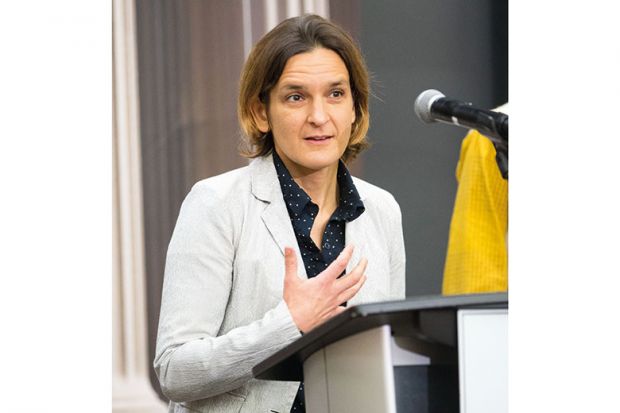The second woman to win a Nobel Prize in Economics hopes that her new book will help change public perception of the discipline and attract more women to a field that is traditionally a “macho culture” unwelcoming to those who are “socially oriented”.
Esther Duflo, Abdul Latif Jameel professor of poverty alleviation and development economics at the Massachusetts Institute of Technology, has carried out detailed empirical work in countries such as India, Kenya, Ghana and Morocco. She and her husband Abhijit V. Banerjee, also a professor at MIT, summarised their findings in a popular book – Poor Economics: A Radical Rethinking of the Way to Fight Global Poverty (2012) – and had no plans to write another.
But then, she said, “the discussion about Brexit and the Trump election in the US, and to some extent the political discussion which exists in France as well” had made them “realise that nobody was interested in listening to what economists had to say”.
The voices that do get heard tend to be “people who call themselves economists but are actually working for a bank or have a stake in the system the way it is” – a minority within a profession where views were actually “much richer and more sophisticated, much more ideologically diverse”, she argued.
Good Economics for Hard Times: Better Answers to Our Biggest Problems, published on 12 November by Allen Lane, is designed to “hold on to hope”. It will certainly attract additional attention now that the authors (together with Michael Kremer of Harvard) have jointly won the 2019 Nobel Prize in Economics “for their experimental approach to alleviating global poverty”. Professor Duflo follows Elinor Ostrom as only the second woman to be so honoured.
On one level, Good Economics for Hard Times uses economic expertise to skewer simplistic thinking. It may sound plausible that an influx of workers from elsewhere depresses wages, admitted Professor Duflo, but “over the last two decades there has been lots of research on episodes where many migrants came into lots of countries and what you find empirically is that there is no negative effect on the wages of the native population”.
But in other areas, she went on, economists may have got it wrong and “the facts are much closer to what [non-experts] think”. There is, Professor Duflo said, a strong consensus among professional economists about the benefits of free trade, for example, but “the analysis has at its core the assumption that when people lose their jobs, they move to take another job, and respond in a fluid manner to what is happening in the world. In fact, they are quite ‘sticky’.”
One of the first people to challenge this consensus, using detailed empirical data from India, was MIT PhD student Petia Topalova.
“The reaction in the academic world was very violent,” recalled Professor Duflo. “She must have made a mistake or overinterpreted her results [economists argued]. People tried to debunk her paper in various ways.” It was only later, when a number of male academics began to build on her ideas, that they began to gain traction.
So what does this say about the willingness of economists as a profession to re-examine their assumptions?
There was something “a bit surprising”, replied Professor Duflo, about “the intensity of the emotional reaction [to Dr Topalova’s work] – perhaps that’s what happens to pioneers”.
That may be true, but doesn’t the episode also have a strong whiff of sexism, of a young woman being firmly put in her place?
Professor Duflo agreed that “the bruising [Dr Topalova] got in seminars is an example of the slightly feisty, macho culture that exists in the field and hasn’t been conducive to getting a lot of women to come in”.
More generally, she said, “many women, and that applies to minorities as well, want to do things which are socially oriented, change the world and that kind of thing. The perception of young people of economics is that economics is not that.” She hoped that her book and Nobel prize would do something to combat this.
As for herself, Professor Duflo “hasn’t encountered a lot of sexism”, adding that “the other face of discrimination is tokenism. I’m a huge beneficiary of that. In my personal life, and it shames me to say it, I perversely benefit from discrimination against women, because if you need a woman [for a panel or committee], there I am.”
There was much outraged commentary on Twitter, when the Nobel prize was announced, about an article that referred to the award going to Professor Banerjee and “his wife”. Was she offended to be apparently marginalised in this way?
Not at all, Professor Duflo replied. That story had been in the Indian press, but the coverage in France had spoken about the prize going to Professor Duflo and “her husband”. She added: “It was not about gender, it was about national pride.”
POSTSCRIPT:
Print headline: Don’t just listen to economists with ‘stake in the system’, says Nobelist
Register to continue
Why register?
- Registration is free and only takes a moment
- Once registered, you can read 3 articles a month
- Sign up for our newsletter
Subscribe
Or subscribe for unlimited access to:
- Unlimited access to news, views, insights & reviews
- Digital editions
- Digital access to THE’s university and college rankings analysis
Already registered or a current subscriber? Login







